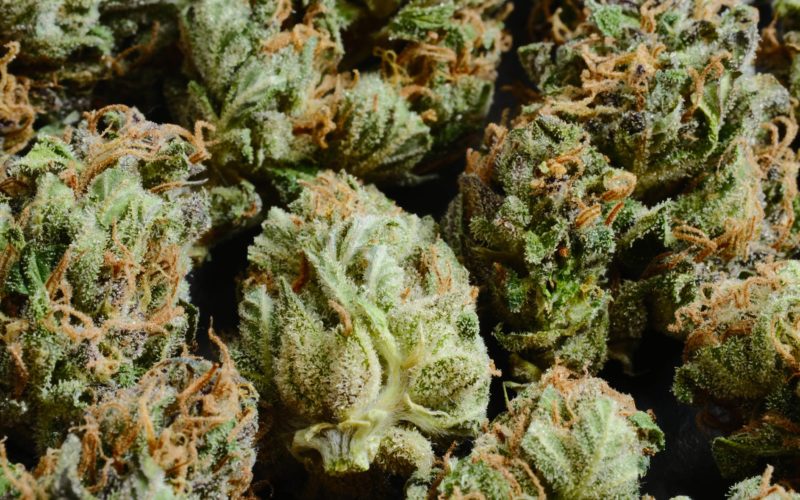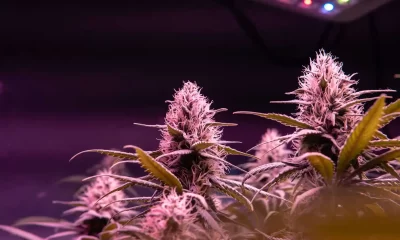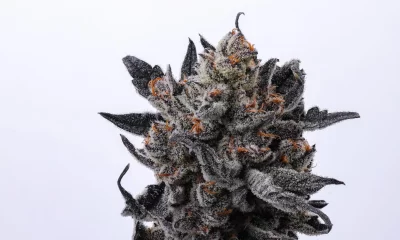Business
Recreational Pot Sales Kick Off in Vermont

Three stores opened in Vermont on Saturday.
Recreational marijuana sales officially launched in Vermont over the weekend, with stores in three communities opening their doors to customers on Saturday.
The three retailers to open this weekend were FLORA Cannabis in Middlebury, Mountain Girl Cannabis in Rutland and CeresMED in Burlington, according to the Associated Press, which noted that a “fourth business has been licensed to sell recreational pot but isn’t ready to do so yet.”
The Burlington Free Press reported on the grand opening at Ceres in Burlington, where the newspaper said that “a line of a couple hundred people stretching from the storefront around the corner and down an alley” had gathered for the occasion.
You would be forgiven if you assumed that recreational pot sales were already underway in the Green Mountain State, which legalized personal possession and cultivation of marijuana for adults back in 2018. The state legalized medical cannabis in 2004; according to the Free Press, Ceres “has been in business for about a decade catering to medical-marijuana customers, and that established infrastructure helped the company get going smoothly.”
But the 2018 law, which was signed by Republican Gov. Phil Scott, did not establish a regulatory framework for an adult-use cannabis market, making Vermont an outlier in the legalization movement.
That changed two years later in 2020, when lawmakers in the state approved a bill that set up a regulated marijuana industry.
“Ten of the eleven states that have legalized adult-use marijuana possession have also wisely regulated the retail cannabis market; until today, Vermont had been the sole exception,” NORML State Policies Coordinator Carly Wolf said at the time.
With Saturday’s openings in Middlebury, Rutland and Burlington, Vermont now becomes the 15th state with legal adult-use cannabis sales.
In signing the bill back in 2020, Scott said that the bill had been “a top priority for the majority in the Legislature for four years, but their work is not complete.”
“They must ensure equity in this new policy and prevent their priority from becoming a public health problem for current and future generations,” Scott said in his signing statement. “For these reasons, I am allowing this bill to become law without my signature.”
According to the Associated Press, the state’s Cannabis Control Board “prioritized review and waived licensing fees for social equity applicants,” such as “[applicants who are] Black or Hispanic, or from communities that historically have been disproportionately affected by cannabis being outlawed or who have been or had a family member who has been incarcerated for a cannabis-related offense.”
Other states that have established a regulated marijuana market have enacted similar social equity measures. In New York, where legal sales could launch by the end of this year, the first round of recreational dispensary licenses will go to individuals who have previously been convicted of a pot-related offense.
The Associated Press reports that “more than 30 social equity applicants, mostly growers, have been approved.”
When he signed the bill that established Vermont’s new cannabis market, Scott noted that it “requires cities and towns to authorize these businesses before retail establishments may open,” and “ensures local zoning applies to cannabis cultivation and production.”
He also said that the law “dedicates 30% of the excise tax, up to $10 million per year, to education and prevention efforts,” and that “the sales and use tax on cannabis would fund a grant program to expand afterschool and summer learning programs.”
Scott said at the time that the state’s ensuing budget “includes language I proposed to move toward a universal afterschool network, which is based on a successful model from Iceland and is focused on preventing drug use and improving academic and social outcomes.”
Source: https://hightimes.com/news/recreational-pot-sales-kick-off-in-vermont/
Business
New Mexico cannabis operator fined, loses license for alleged BioTrack fraud

New Mexico regulators fined a cannabis operator nearly $300,000 and revoked its license after the company allegedly created fake reports in the state’s traceability software.
The New Mexico Cannabis Control Division (CCD) accused marijuana manufacturer and retailer Golden Roots of 11 violations, according to Albuquerque Business First.
Golden Roots operates the The Cannabis Revolution Dispensary.
The majority of the violations are related to the Albuquerque company’s improper use of BioTrack, which has been New Mexico’s track-and-trace vendor since 2015.
The CCD alleges Golden Roots reported marijuana production only two months after it had received its vertically integrated license, according to Albuquerque Business First.
Because cannabis takes longer than two months to be cultivated, the CCD was suspicious of the report.
After inspecting the company’s premises, the CCD alleged Golden Roots reported cultivation, transportation and sales in BioTrack but wasn’t able to provide officers who inspected the site evidence that the operator was cultivating cannabis.
In April, the CCD revoked Golden Roots’ license and issued a $10,000 fine, according to the news outlet.
The company requested a hearing, which the regulator scheduled for Sept. 1.
At the hearing, the CCD testified that the company’s dried-cannabis weights in BioTrack were suspicious because they didn’t seem to accurately reflect how much weight marijuana loses as it dries.
Company employees also poorly accounted for why they were making adjustments in the system of up to 24 pounds of cannabis, making comments such as “bad” or “mistake” in the software, Albuquerque Business First reported.
Golden Roots was fined $298,972.05 – the amount regulators allege the company made selling products that weren’t properly accounted for in BioTrack.
The CCD has been cracking down on cannabis operators accused of selling products procured from out-of-state or not grown legally:
- Regulators alleged in August that Albuquerque dispensary Sawmill Sweet Leaf sold out-of-state products and didn’t have a license for extraction.
- Paradise Exotics Distro lost its license in July after regulators alleged the company sold products made in California.
Golden Roots was the first alleged rulebreaker in New Mexico to be asked to pay a large fine.
Source: https://mjbizdaily.com/new-mexico-cannabis-operator-fined-loses-license-for-alleged-biotrack-fraud/
Business
Marijuana companies suing US attorney general in federal prohibition challenge

Four marijuana companies, including a multistate operator, have filed a lawsuit against U.S. Attorney General Merrick Garland in which they allege the federal MJ prohibition under the Controlled Substances Act is no longer constitutional.
According to the complaint, filed Thursday in U.S. District Court in Massachusetts, retailer Canna Provisions, Treevit delivery service CEO Gyasi Sellers, cultivator Wiseacre Farm and MSO Verano Holdings Corp. are all harmed by “the federal government’s unconstitutional ban on cultivating, manufacturing, distributing, or possessing intrastate marijuana.”
Verano is headquartered in Chicago but has operations in Massachusetts; the other three operators are based in Massachusetts.
The lawsuit seeks a ruling that the “Controlled Substances Act is unconstitutional as applied to the intrastate cultivation, manufacture, possession, and distribution of marijuana pursuant to state law.”
The companies want the case to go before the U.S. Supreme Court.
They hired prominent law firm Boies Schiller Flexner to represent them.
The New York-based firm’s principal is David Boies, whose former clients include Microsoft, former presidential candidate Al Gore and Elizabeth Holmes’ disgraced startup Theranos.
Similar challenges to the federal Controlled Substances Act (CSA) have failed.
One such challenge led to a landmark Supreme Court decision in 2005.
In Gonzalez vs. Raich, the highest court in the United States ruled in a 6-3 decision that the commerce clause of the U.S. Constitution gave Congress the power to outlaw marijuana federally, even though state laws allow the cultivation and sale of cannabis.
In the 18 years since that ruling, 23 states and the District of Columbia have legalized adult-use marijuana and the federal government has allowed a multibillion-dollar cannabis industry to thrive.
Since both Congress and the U.S. Department of Justice, currently headed by Garland, have declined to intervene in state-licensed marijuana markets, the key facts that led to the Supreme Court’s 2005 ruling “no longer apply,” Boies said in a statement Thursday.
“The Supreme Court has since made clear that the federal government lacks the authority to regulate purely intrastate commerce,” Boies said.
“Moreover, the facts on which those precedents are based are no longer true.”
Verano President Darren Weiss said in a statement the company is “prepared to bring this case all the way to the Supreme Court in order to align federal law with how Congress has acted for years.”
While the Biden administration’s push to reschedule marijuana would help solve marijuana operators’ federal tax woes, neither rescheduling nor modest Congressional reforms such as the SAFER Banking Act “solve the fundamental issue,” Weiss added.
“The application of the CSA to lawful state-run cannabis business is an unconstitutional overreach on state sovereignty that has led to decades of harm, failed businesses, lost jobs, and unsafe working conditions.”
Business
Alabama to make another attempt Dec. 1 to award medical cannabis licenses

Alabama regulators are targeting Dec. 1 to award the first batch of medical cannabis business licenses after the agency’s first two attempts were scrapped because of scoring errors and litigation.
The first licenses will be awarded to individual cultivators, delivery providers, processors, dispensaries and state testing labs, according to the Alabama Medical Cannabis Commission (AMCC).
Then, on Dec. 12, the AMCC will award licenses for vertically integrated operations, a designation set primarily for multistate operators.
Licenses are expected to be handed out 28 days after they have been awarded, so MMJ production could begin in early January, according to the Alabama Daily News.
That means MMJ products could be available for patients around early March, an AMCC spokesperson told the media outlet.
Regulators initially awarded 21 business licenses in June, only to void them after applicants alleged inconsistencies with how the applications were scored.
Then, in August, the state awarded 24 different licenses – 19 went to June recipients – only to reverse themselves again and scratch those licenses after spurned applicants filed lawsuits.
A state judge dismissed a lawsuit filed by Chicago-based MSO Verano Holdings Corp., but another lawsuit is pending.
Source: https://mjbizdaily.com/alabama-plans-to-award-medical-cannabis-licenses-dec-1/
-

 Business2 years ago
Business2 years agoPot Odor Does Not Justify Probable Cause for Vehicle Searches, Minnesota Court Affirms
-

 Business2 years ago
Business2 years agoNew Mexico cannabis operator fined, loses license for alleged BioTrack fraud
-

 Business2 years ago
Business2 years agoAlabama to make another attempt Dec. 1 to award medical cannabis licenses
-

 Business2 years ago
Business2 years agoWashington State Pays Out $9.4 Million in Refunds Relating to Drug Convictions
-

 Business2 years ago
Business2 years agoMarijuana companies suing US attorney general in federal prohibition challenge
-

 Business2 years ago
Business2 years agoLegal Marijuana Handed A Nothing Burger From NY State
-

 Business2 years ago
Business2 years agoCan Cannabis Help Seasonal Depression
-

 Blogs2 years ago
Blogs2 years agoCannabis Art Is Flourishing On Etsy













